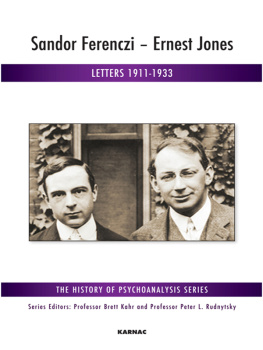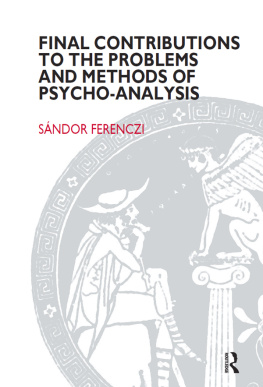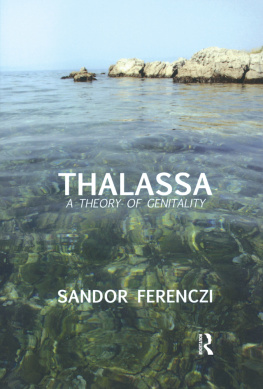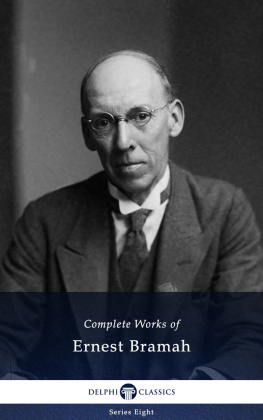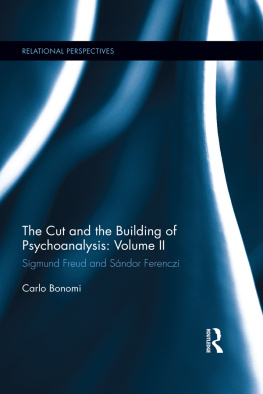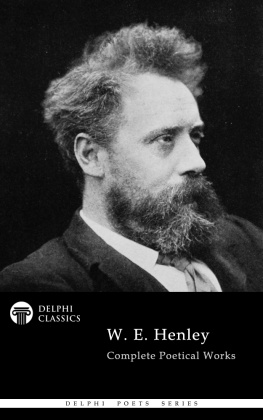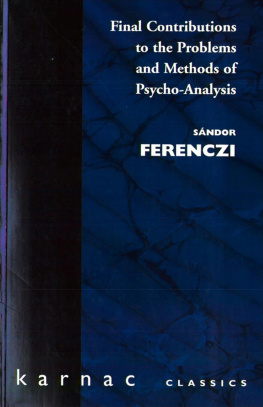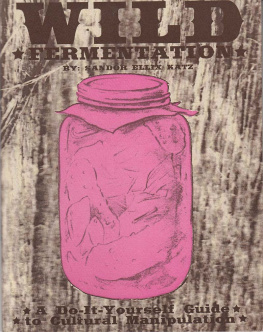Ferenczi Sandor - Ernest Jones
Here you can read online Ferenczi Sandor - Ernest Jones full text of the book (entire story) in english for free. Download pdf and epub, get meaning, cover and reviews about this ebook. year: 2013, publisher: Karnac Books, genre: Detective and thriller. Description of the work, (preface) as well as reviews are available. Best literature library LitArk.com created for fans of good reading and offers a wide selection of genres:
Romance novel
Science fiction
Adventure
Detective
Science
History
Home and family
Prose
Art
Politics
Computer
Non-fiction
Religion
Business
Children
Humor
Choose a favorite category and find really read worthwhile books. Enjoy immersion in the world of imagination, feel the emotions of the characters or learn something new for yourself, make an fascinating discovery.
- Book:Ernest Jones
- Author:
- Publisher:Karnac Books
- Genre:
- Year:2013
- Rating:3 / 5
- Favourites:Add to favourites
- Your mark:
- 60
- 1
- 2
- 3
- 4
- 5
Ernest Jones: summary, description and annotation
We offer to read an annotation, description, summary or preface (depends on what the author of the book "Ernest Jones" wrote himself). If you haven't found the necessary information about the book — write in the comments, we will try to find it.
Ernest Jones — read online for free the complete book (whole text) full work
Below is the text of the book, divided by pages. System saving the place of the last page read, allows you to conveniently read the book "Ernest Jones" online for free, without having to search again every time where you left off. Put a bookmark, and you can go to the page where you finished reading at any time.
Font size:
Interval:
Bookmark:
ABBREVIATIONS
| BPAS Archives | Archives of the British Psychoanalytical Society, London |
| Bul Int Psychoanal Assn | Bulletin of the International Psychoanalytical Association |
| Die Rundbriefe, 1, 2, 3, 4 | The circular letters of the Secret Committee Volume 1. 19131920; Volume 2: 1921; Volume 3: 1922; Volume 4: 19231927 (Wittenberger & Tgel, 19992006) |
| FerencziGroddeck | The Sndor Ferenczi & Georg Groddeck Correspondence (Fortune, 2002) |
| FreudAbraham | Sigmund Freud & Karl Abraham Correspondence(Falzeder, 2002) |
| FreudEitingon, 1, 2 | Sigmund Freud und Max Eitingon: Briefwechsel 19061939 (Sigmund Freud & Max Eitingon: Correspondence 19061939) (2 Volumes) (Schrter, 2004) |
| FreudFerenczi, 1 | The Correspondence of Sigmund Freud andSndor Ferenczi, Volume 1, 19081914 (Falzeder & Brabant, 1994) |
| FreudFerenczi, 2 | The Correspondence of Sigmund Freud andSndor Ferenczi, Volume 2, 19141919 (Falzeder & Brabant, 1996) |
| FreudFerenczi, 3 | The Correspondence of Sigmund Freud andSndor Ferenczi, Volume 3, 19201933. (Falzeder & Brabant, 2000) |
| FreudJones | The Complete Correspondence of Sigmund Freudand Ernest Jones (19081939) (Paskaukas, 1993) |
| FreudJung | The FreudJung Letters: The Correspondencebetween Sigmund Freud and C. G. Jung (McGuire, 1994) |
| Imago | Imago. Zeitschrift fr Anwendung derPsychoanalyse auf die Geisteswissenschaften |
| IPA | International Psychoanalytical Association |
| Jahrbuch | Jahrbuch fr psychoanalytische undpsychopathologische Forschungen |
| Jones, 2, 3 | The Life and Work of Sigmund Freud, Volume 2:Years of Maturity 19011919 and The Life andWork of Sigmund Freud, Volume 3: The LastPhase 19191939 (Jones, 1955 & 1957) |
| Journal | The International Journal of Psychoanalysis London |
| Minutes, 4 | Minutes of the Vienna Psychoanalytic Society, Volume 4: 19121918. (Nunberg & Federn, 1974) |
| () | Psychoanalysis |
| S.E. | The Standard Edition of the CompletePsychological Works of Sigmund Freud, Volumes124. |
| Verlag | Internationaler Psychoanalytischer Verlag |
| Zeitschrift | Internationale Zeitschrift fr (rtzliche)Psychoanalyse. Leipzig, Vienna, Zrich |
| Zentralblatt | Zentralblatt fr Psychoanalyse. MedizinischeMonatsschrift fr Seelenkunde |
ABOUT THE EDITORS
Ferenc Ers studied psychology and literature at the ELTE University in Budapest, and graduated in 1969. He obtained his PhD in 1986, and he has borne the title Doctor of the Hungarian Academy of Sciences (DSc) since 2002. Currently, he is Professor of Social Psychology at the Faculty of Humanities of the University of Pcs, where he has directed a doctoral programme in psychoanalytic studies since 1997. He also directs a social psychological research unit at the Institute of Cognitive Neuroscience and Psychology, at the Research Centre of Natural Sciences of the Hungarian Academy of Sciences in Budapest. In the academic year 20102011, he was a senior fellow at the Collegium Budapest, Institute for Advanced Studies. The focus of his present research areas include the social and cultural history of psychoanalysis in Central Europe, psychoanalytic theory and its application to social issues, and the problem of trauma and cultural memory. He edited the Hungarian translation of the FreudFerenczi correspondence, and, in his areas of research, is the author of several scientific books and articles in English, Hungarian, German, and French. He founded Thalassa, the journal of the Sndor Ferenczi Society in Budapest, which he edited from 19902010. At present, he edits Img Budapest, the journal of the Hungarian Imago Association.
Judit Szekacs-Weisz is a bilingual psychoanalyst and psychotherapist, a member of the British Psychoanalytical Society and the Group of Independent Psychoanalysts, and a training analyst of the Hungarian Psychoanalytical Society. Born and educated (mostly) in Budapest, she has absorbed the ideas and way of thinking of Ferenczi, the Balints, Hermann, and Rajka as integral parts of a professional mother tongue. The experience of living and working in a totalitarian regime sensitised her to the social and individual aspects of trauma, identity formation, and strategies of survival. Szekacs-Weisz was a founding member of the Sndor Ferenczi Society, Budapest. In 1990, she moved to London, where, with a small group of psychoanalysts, therapists, artists, and social scientists, she founded Imago East West, and, later, the Multilingual Psychotherapy Centre (MLPC) to create a space where diverse experiences of living and changing context and language in different cultures can be explored and creative solutions found. She is the author of several articles, and co-editor of Lost Childhood and the Language of Exile (Freud Museum & Imago East West, 2004). Together with Tom Keve, she co-edited Ferenczi and His World and Ferenczi for Our Time, both published by Karnac Books, London, in 2012. Szekacs-Weisz is President of Imago International.
Ken Robinson is a psychoanalyst in private practice in Newcastle upon Tyne and the Honorary Archivist for the British Psychoanalytical Society. He is a training analyst for trainings in child, adolescent, and adult psychotherapy in the North of England and in Scotland. He lectures and teaches in the UK and Europe, and is especially interested in the developmental point of view, the nature of therapeutic action, and the history of psychoanalysis. His most recent publication is a brief history of the British Psychoanalytical Society.
ACKNOWLEDGEMENTS
The publication of the FerencziJones correspondence is the result of a professional team working together since 2004. The list of contributors is long, but their work was essential in producing this book. Here, we would like to thank Melinda Friedrich, a PhD student in psychoanalytic history and German philology, who transcribed Ferenczi's German handwritten letters and also worked on the notes for the Hungarian edition. The transcribed text in German (and in Hungarian translation by Petrik Bottka) was first published in a special issue of the review Thalassa in 2008. The transcription and the notes were later reviewed by Ernst Falzeder (Salzburg), while the notes were further developed and completed by Ken Robinson (London). Based on these improvements, a new Hungarian translation was published in 2010, in one volume together with Ferenczi's correspondence with Georg Groddeck.
The letters in the present volume were translated from German into English by Beate Schumacher (psychoanalyst, member of the BPAS), who turned out to be a true successor to Joan Suttie in that she was able to find a way of translating not only the meaning, but also the affective charge of Ferenczi's words. Her attention to detail and style made her contribution to this volume even more valuable.
The first version of the introductory essay was translated from Hungarian into English by Mark Baczoni, and the final text was also reviewed by him.
We want to express our gratitude to Anna Kovcs for her invaluable contribution to editing the texts and the notes. We are also thankful to Ildik Kovcs for her technical assistance.
In preparing the publication of this correspondence, we received support, assistance, and advice from various institutions and colleagues. First of all, we thank the Archives of the British Psychoanalytical Society for their extensive and enthusiastic support, and Judith Dupont (Paris) who gave us permission to publish Ferenczi's letters to Jones.
Next pageFont size:
Interval:
Bookmark:
Similar books «Ernest Jones»
Look at similar books to Ernest Jones. We have selected literature similar in name and meaning in the hope of providing readers with more options to find new, interesting, not yet read works.
Discussion, reviews of the book Ernest Jones and just readers' own opinions. Leave your comments, write what you think about the work, its meaning or the main characters. Specify what exactly you liked and what you didn't like, and why you think so.

